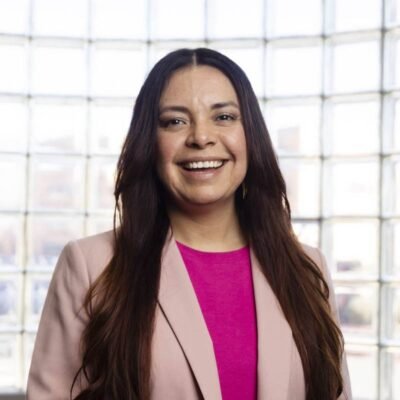Monday, Nov. 11, 2024 | 2 a.m.
Harrison Jones, 13, was approached by his history teacher at Thurman White Middle School in Henderson on Wednesday with a message: “It passed.”
The “it” was Ballot Question 2 to revise the Nevada Constitution to remove outdated language referring to public entities that serve people with mental illness, blindness or deafness. It passed with almost 66% — or 827,429 votes — in favor and 34% against.
And it passed because Harrison and his older sister, Alexis Jones, 17, worked tirelessly over the years to advocate for the deaf community they are part of.
The siblings, who were born hard of hearing, grew up without a school for deaf students in Nevada, having to constantly advocate for themselves and educate their peers on the experiences of a person with deafness.
That effort included traveling to Carson City to testify at the Nevada Legislature in support of getting the amendment on the ballot.
The approval by voters could open the door to more opportunities and conversations on important issues for people with disabilities, they said.
“I felt great knowing that in the future, hard of hearing kids and adults can know they don’t have to worry about (the words) ‘deaf and dumb,’ ” Harrison Jones said.
The ballot question calls for changing the descriptions of people who benefit from state “institutions” as “insane,” “blind,” and “deaf and dumb.” It would instead refer to “persons with significant illness,” “persons who are blind or visually impaired” and “persons who are deaf or hard of hearing” who benefit from state “entities.”
With Tuesday’s passage, “persons with intellectual or developmental disabilities” will also be added to the list of those who benefit from state programs.
The measure was proposed in the 2021 and 2023 legislative sessions by state Sen. Robin Titus, R-Wellington.
By law, the measure needed to secure lawmaker approval in two sessions to be placed on the ballot. It passed unanimously in the Nevada Senate and Nevada Assembly during both sessions.
Titus, a physician, was inspired to create the bill by Andrew Campbell, a constituent with total deafness in one ear who had experienced temporary total blindness. He taught special education at Churchill County Middle School in Fallon and spent his afternoons instructing students on American Sign Language.
The antiquated language in the Nevada Constitution, which was adopted in 1864, contains terms that are “discriminating, stigmatizing or derogatory” toward people with disabilities, Titus said.
“I am aware that when the Nevada Constitution was written, different terminologies were used to describe persons with disabilities or a mental illness,” Titus said during the Assembly Committee on Health and Human Services at the resolution’s first hearing in 2021. “However, more than 156 years after Nevada was admitted into the Union, it is time to give these words a more critical look.”
Replacing the originally written terms would “avoid stigmatizing and marginalizing individuals and reduce the discriminatory barriers they may face when seeking employment, housing or mental health services,” the proposal said.
These new terms are described as “people-first language,” which puts an emphasis on the person and not their disability, said Emma Frances Bloomfield, an associate professor of communication studies at UNLV who trains people on using inclusive language in the workplace.
The Nevada Constitution was written at a time when there wasn’t much understanding of disabilities, so people who lived with them were often jailed and referred to with derogatory language, she said.
“In the case of Ballot Question 2, these are terms that we just don’t typically use in parlance to talk about people with disabilities,” Bloomfield said. “We’re removing some of those associations, seeing people not just as disabilities but seeing them as people.”
While Bloomfield was “heartened” the amendment passed, she said it’s interesting that many Nevadans voted for the more inclusive language while also casting a vote for President-elect Donald Trump, who won another term in the White House. Nevada voted to elect Trump, who in 2015 mocked a New York Times journalist with a physical disability during a campaign rally in South Carolina, The Associated Press reported.
People should start looking at who they support, what policies they’re voting for and which services are or aren’t being offered, she said.
Bloomfield also hopes the ballot passage is “a step in the right direction” toward having more conversations about things like inclusive language or how people prefer to be referred to, since people in the disability community have varying opinions on the types of language to use.

The Jones Family, from left, Beth, Alexis, Harrison, Coleman, Josh with Senator Robin Titus at the 2019 Children’s Day at the Legislature in Carson City.
The Jones family — including Coleman Jones, a sophomore at Southeast Career Technical Academy, and their father, Josh — has traveled the nearly 435 miles to Carson City three times to testify in the support of the amendment. Mom Beth Jones, the executive director of the deaf and hard of hearing nonprofit Nevada Hands and Voices, still corresponds with Titus, who met the Jones family during the previous legislative sessions and will occasionally ask for life updates, she said.
Beth Jones was especially proud to know that her children “inspired other kids that are testifying and sharing their stories,” which she believes “just helps really support that whole community (and) just encouraging everybody that ‘their’ voice counts, whether they speak or sign.”
But the Joneses don’t want the work to stop there.
Harrison and Alexis Jones said they will continue to work in their own community and beyond to get people the resources they need, whether that’s making informational posters for their classrooms full of typical-hearing students or reigniting the push for Nevada to build a school for people living with deafness or blindness.
“There’s so many (stigmas) out there, but that’s just the thing, especially with this bill as well: These issues aren’t really being made aware. We’re kind of almost struggling in silence, a little bit, quite literally,” Alexis Jones said. “Me having these problems being brought to light is helping not only the deaf community, but is helping other communities bring their problems and their awareness to light so that we can all shine a light and help at least emphasize or relate to these sorts of problems in our community and try to fix them.”
[email protected] / 702-948-7854 / @gracedarocha





